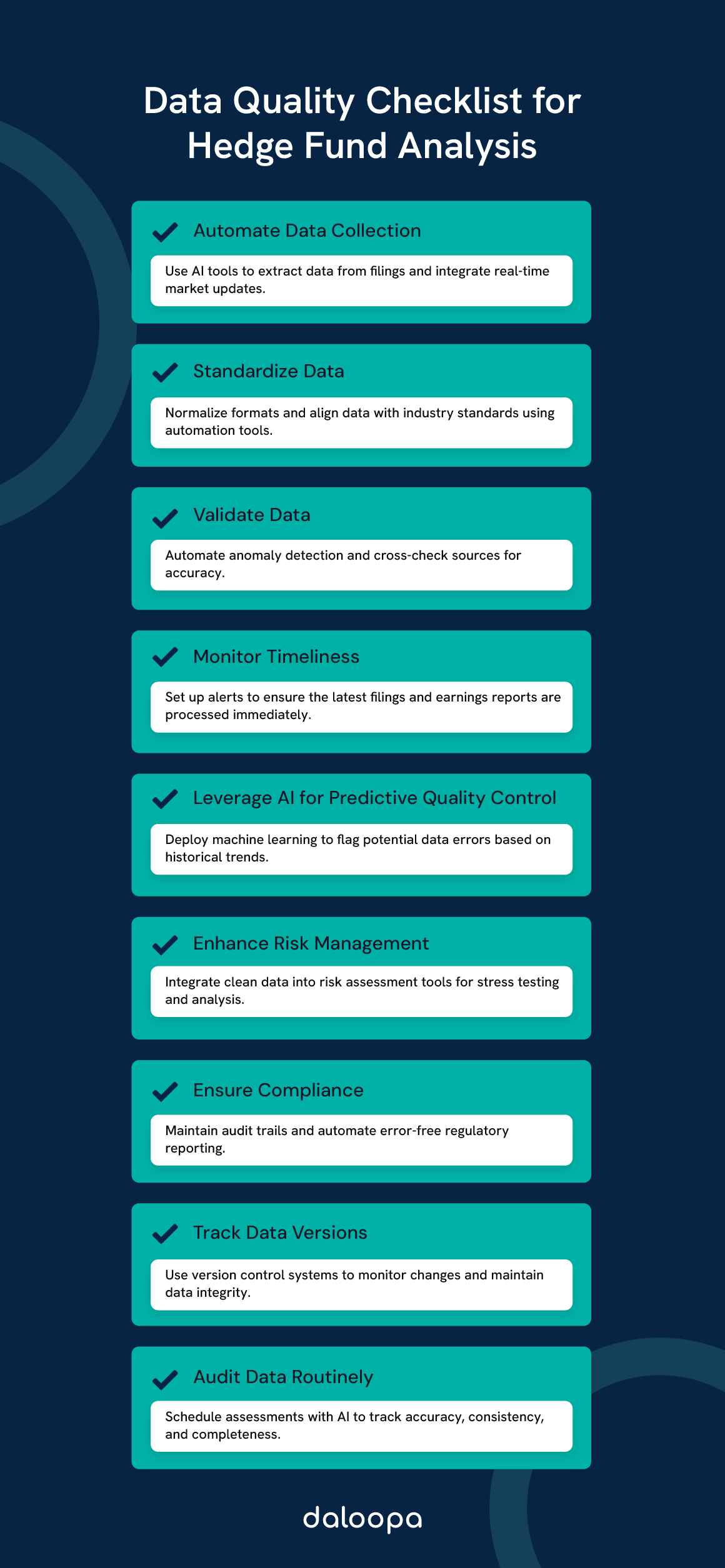Imagine an analyst losing millions because a crucial data feed was flawed—this is the real risk every hedge fund faces. In today’s fast‐paced and data‐driven markets, data quality forms the backbone of effective investment strategies.
Hedge fund analysts rely on precise and dependable data to generate alpha, manage risk, and navigate regulatory challenges. Superior data quality means having accurate, complete, consistent, and timely information, which empowers analysts to make confident decisions and stay ahead in a competitive industry.
Hedge funds source data from financial statements, market data feeds, proprietary databases, and alternative data streams. Poor-quality information can lead to flawed models and misguided predictions, costing funds dearly in performance and reputation.
In a world where every millisecond matters, prioritizing data quality for hedge fund analysis is not just a technical necessity but a competitive advantage that can differentiate top-performing funds from their peers.
Key Takeaways
- Reliable data is indispensable for sound hedge fund analysis and decision-making.
- High-quality data supports effective risk management and enhances fund performance.
- Maintaining data integrity fosters regulatory compliance and builds investor trust.
Defining Data Quality for Hedge Fund Analysis
Data quality encompasses the accuracy, completeness, consistency, and timeliness of analysts’ financial information to drive investment strategies and regulatory reporting. Whether an analyst evaluates a merger, assesses a company’s financial health, or detects subtle market anomalies, the quality of the data is critical to every decision.
Investment Decision-Making
High-quality and accurate hedge fund data underpins effective investment decision-making. Analysts depend on clean and consistent datasets—from historical market trends to real-time economic indicators—to identify opportunities and assess risks. This reliability enables firms to allocate capital and fine-tune their quantitative models confidently.
For example, imagine a hedge fund that uses outdated earnings data to build its investment model. This oversight could distort portfolio allocations and lead to suboptimal returns. By contrast, a fund implementing stringent quality metrics can rank data sources by reliability, ensuring that only high-confidence data informs critical decisions.
Regulatory Compliance and Risk Management
Hedge funds must adhere to strict regulatory requirements while managing the risks inherent in complex financial markets. Data quality for hedge fund analysis plays an integral role in meeting these standards, whether for compliance reports, anti-money laundering (AML) checks, or risk assessments.
Robust validation protocols—such as cross-referencing multiple sources, maintaining detailed audit trails, and using automated error-detection systems—ensure that regulatory filings are based on trustworthy data. In addition, accurate hedge fund data supports stress tests and scenario analyses that reveal how a fund might perform under extreme market conditions.
Consider regulatory frameworks like MiFID II, GDPR, or the SEC’s reporting guidelines. Funds that invest in scalable, integrated data management platforms like Daloopa reduce their exposure to regulatory risk. By proactively adopting hedge fund data governance frameworks and modern validation tools, hedge funds can meet compliance requirements and foster long-term institutional resilience and investor confidence.
Impact of Data Quality on Hedge Fund Analysts
Data quality for hedge fund analysis directly influences an analyst’s ability to forecast trends, mitigate risks, and optimize performance. Timely and accurate hedge fund data empowers analysts to conduct detailed risk assessments, spot profitable opportunities, and precisely evaluate fund performance. In a high-stakes environment, even a small error in data can lead to significant financial losses and erode client trust.
Poor-quality data might result from outdated information or inherent biases in self-reported figures, leading to inaccurate performance metrics. To counter these issues, hedge funds can:
- Employ Rigorous Validation Techniques: Use statistical tests and automated tools to verify the accuracy of incoming data.
- Cross-Verify Multiple Sources: Consolidate information from various reputable databases to ensure consistency.
- Leverage Advanced Analytics: Implement machine learning algorithms to detect subtle anomalies before they disrupt analyses.
- Regularly Audit Data Management Systems: Ensure continuous compliance with internal standards and regulatory guidelines.
When hedge funds champion data quality, they reduce risks and enhance their ability to generate superior outcomes for investors. The value of data lies not just in its availability but in its reliability and actionable insight.

Strategies for Ensuring Data Quality
Maintaining data quality for hedge fund analysis is essential to making sound decisions and staying compliant with regulations. Effective strategies ensure consistency, accuracy, and reliability.
Best Practices and Industry Standards
Clear hedge fund data governance policies are the backbone of quality management. Firms must define roles, responsibilities, and workflows to ensure data remains accurate. Regular audits and standardized data formats are vital for eliminating ambiguities and fostering team confidence.
In addition, detailed documentation of data origin, transformation processes, and usage is critical. Such records support internal troubleshooting and serve as proof during regulatory audits. For instance, when a fund needs to demonstrate compliance with reporting standards, comprehensive documentation can expedite the process and reduce legal risk.
Tools and Technologies
Modern technology simplifies data quality efforts. Data profiling software quickly evaluates datasets for completeness and accuracy, while ETL (Extract, Transform, Load) platforms automate cleaning and integration processes, reducing the risk of manual errors. Machine learning algorithms further enhance these processes by detecting subtle anomalies in real-time.
Version control systems track changes in data and models, ensuring transparency and reproducibility. As funds increasingly depend on complex data architectures, investing in scalable and integrated solutions—such as Daloopa’s AI-powered financial modeling tools—becomes essential for maintaining data integrity while accelerating workflows.
Challenges and Solutions in Data Quality Management
Hedge funds face ongoing challenges in managing data quality. Common issues include data inconsistencies from disparate sources, incomplete records, and data obsolescence due to rapidly changing market conditions. These challenges can lead to non-compliance and reputational damage if not addressed properly.
To overcome these hurdles, hedge funds can:
- Improve Real-Time Data Quality: Automation through machine learning enables instant detection and resolution of errors. Real-time data cleansing systems standardize formats and remove duplicates, ensuring the latest information is always available.
- Centralize Data Management: Clear data ownership and robust access protocols improve consistency. By fostering a culture of data literacy, teams are better equipped to identify and rectify problems proactively.
- Encourage IT and Business Collaboration: Close collaboration between technical teams and business units ensures that data quality initiatives align with operational goals, maximizing impact.
When these strategies are effectively implemented, hedge funds can create a cohesive data quality management system that supports immediate decision-making and long-term strategic planning.
Actionable Takeaways for Hedge Fund Analysts
To capitalize on the benefits of high data quality, hedge fund analysts must implement robust hedge fund data governance and adopt advanced technologies. Here are some actionable steps:
- Audit Your Data Pipelines Now: Conduct a comprehensive audit of your current data sources. Identify inconsistencies, outdated records, and gaps in data coverage.
- Invest in Automation: Implement automated data validation and cleansing tools—preferably those that incorporate machine learning—to ensure real-time data accuracy.
- Adopt Integrated Platforms: Choose a scalable, integrated data management solution (like Daloopa’s AI-powered platform) that can seamlessly update your models and support regulatory compliance.
- Establish Clear Governance: Develop and enforce hedge fund data governance policies that outline roles, responsibilities, and protocols for data quality management. Ensure regular audits and documentation.
- Embrace AI and RegTech: Explore advanced AI tools and RegTech solutions to automate compliance and enhance predictive analytics. These technologies will help you stay ahead of market trends and regulatory requirements.
By taking these steps, hedge funds enhance data quality for hedge fund analysis, improving their immediate decision-making and securing a sustainable competitive edge in an increasingly complex financial landscape.
Ready to Stop the Manual Data Hassles?
If you’re an analyst tired of spending countless hours on manual data updates and reconciliations, it’s time to switch to an automated, AI-powered solution. With Daloopa’s innovative platform, you can easily build and update your financial models, ensuring complete, auditable, and real-time data feeds that drive faster, more informed decisions.
Create a free Daloopa account or request a demo today to experience how streamlined, high-quality, and accurate hedge fund data can transform your hedge fund’s performance and give you the competitive edge you need. Visit Daloopa to learn more about our solutions designed specifically for hedge funds and financial analysts.



